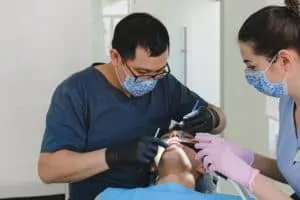
There are some things your dentist can tell you about you just from looking at your teeth, even if you don’t volunteer that information with them. Let’s take a look at some of the things your dentist in Asheboro may notice about you and your habits.
- You’re a Nail Biter
Why would your dentist care if you nervously or habitually bite your nails? Well, nail biters often have tiny chips or cracks in their teeth that may be invisible to the naked eye but can show up on dental x-rays. These cracks provide a great place for bacteria to nestle in and increase the likelihood of decay. Nail biters may also suffer from TMD or TMJ thanks to changes in their bite. TMD/TMJ disorder can be a painful condition that may also lead to headaches and increased jaw pain or jaw clicking.
- You’re a Smoker
One of the most common habits patients try to hide is being a smoker. They’ll use perfume, mints, mouthwash, and everything in between to try and cover up the smell of cigarettes. But the truth is, your dentist in Asheboro can probably still tell that you smoke. You see, cigarette smoke doesn’t just disappear. In fact, the smell can seep into the soft tissues of your mouth and linger around long after you light up. Additionally, smokers tend to have telltale tooth staining as a result of the nicotine.
- You Don’t Floss as Much as You Should
We know that you don’t like to floss, nobody does. But it is incredibly important that you do your best to floss every day. If you don’t, and you save your annual flossing session to the day before or the day of your appointment, we’ll know. Patients who avoid flossing often have swollen, red gums that bleed almost as soon as their appointment begins. Bleeding gums are unhealthy gums and may be a sign of gum disease.
- You Don’t Brush Often Enough
Similarly to flossing, your dental team will also be able to tell if you don’t brush your teeth often enough or even if you brush too hard. Those who don’t brush the recommended two times a day will often have larger areas of tartar buildup and puffy, red gums. Additionally, if you brush too hard you may have gum recession or worn enamel which can cause tooth sensitivity and increase your chances of cavities.
We encourage you to always be honest with your dentist in Asheboro and every member of your healthcare team. If we don’t know about certain things that can affect both your health and your treatment, you won’t get the best care possible for you. We understand that some things may be embarrassing to share, but it’s important to know that your dental team is only here to help you, not to judge you.






 When many of us think about losing our teeth, we may assume that this is something that just happens as we get older. But, according to the
When many of us think about losing our teeth, we may assume that this is something that just happens as we get older. But, according to the 







